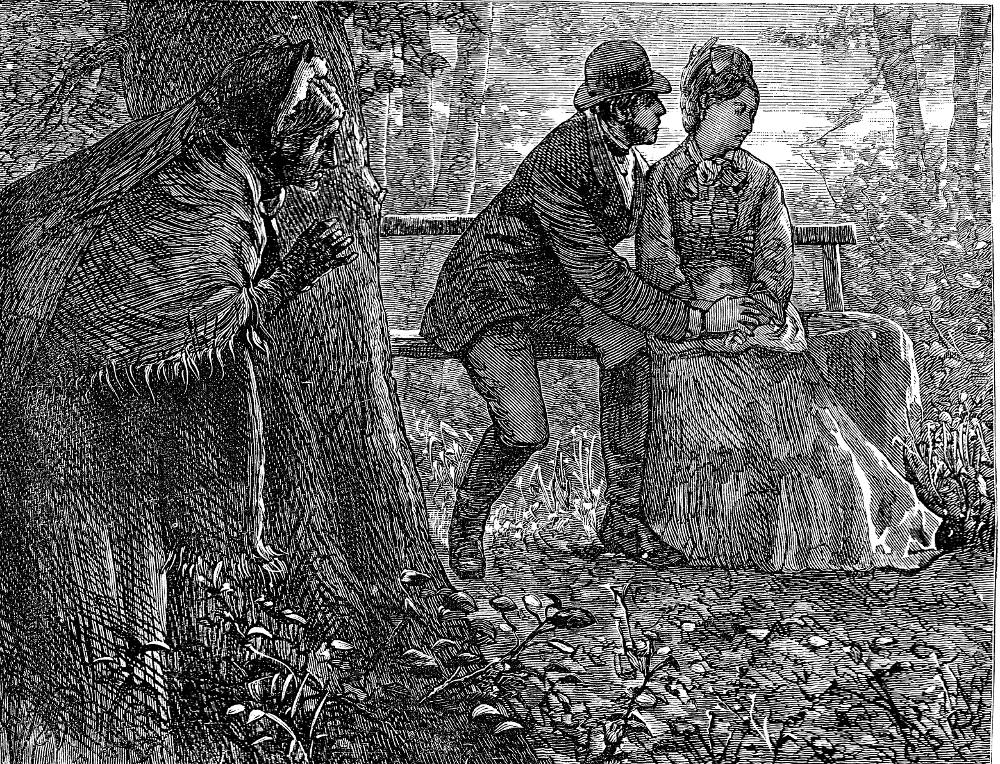
Mrs. Sparsit Advanced Closer To Them by Harry French. Wood engraving. 13.9 cm wide x 9.3 cm high. Illustration for Dickens's Hard Times for These Times in the British Household Edition (1877), Book Two, "Reaping," Chapter Eleven, "Lower and Lower," 96; running head: "Great Failure of the House of Gradgrind," 97.
Context of the Illustration
Bending low among the dewy grass, Mrs. Sparsit advanced closer to them. She drew herself up, and stood behind a tree, like Robinson Crusoe in his ambuscade against the savages; so near to them that at a spring, and that no great one, she could have touched them both. He was there secretly, and had not shown himself at the house. He had come on horseback, and must have passed through the neighbouring fields; for his horse was tied to the meadow side of the fence, within a few paces.
"My dearest love," said he, "what could I do? Knowing you were alone, was it possible that I could stay away?"
"You may hang your head, to make yourself the more attractive; I don’t know what they see in you when you hold it up," thought Mrs. Sparsit; "but you little think, my dearest love, whose eyes are on you!"
That she hung her head, was certain. She urged him to go away, she commanded him to go away; but she neither turned her face to him, nor raised it. Yet it was remarkable that she sat as still as ever the amiable woman in ambuscade had seen her sit, at any period in her life. Her hands rested in one another, like the hands of a statue; and even her manner of speaking was not hurried.
"My dear child," said Harthouse; Mrs. Sparsit saw with delight that his arm embraced her; ‘will you not bear with my society for a little while?"
"Not here." [Book Two, "Reaping," Chapter Eleven, "Lower and Lower," 94]
Commentary
In Plate 14, we return to the wood and the clearing filled with felled trees where Harthouse and Louisa customarily meet, but this time the informing consciousness is that of the jealous, spiteful Mrs. Sparsit. Watching James Harthouse and Louisa Bounderby as if she were Satan watching that happy couple in Milton's Paradise Lost (or, more pertinently given the modern fairytale quality of Hard Times, a witch or wolf stalking a pair of children lost in the forest), the bank harpy is the focus of Dickens's limited omniscient point of view in this scene. To realise this point of view visually, French has stationed her downstage centre and minimized the importance of the young couple by stationing them upstage left. Louisa is now in the full mourning that Victorian custom required during the year after a parent's death rather than the white or light colours she has worn up to this point. The text supports Mrs. Sparsit's view that Harthouse and Louisa are "savages" because they are about to the transgress the commandment against adultery (if they have not already done so). It also supports her idea of herself as defender of civilised values, but the wood-engraving depicts them as apparently innocent. They are, after all, merely talking, and in French's illustration she is not nearly close enough to catch what they are saying. French omits another key detail: Dickens suggests Harthouse's violation of normal social constraints by his having avoided calling at the house first; instead, he has made a direct approach on horseback through the fields. French, however, neither shows a horse "within a few paces" (II: 11) of the couple nor depicts Harthouse in riding-habit as Reinhart had done the year before in the American Household Edition (see below).

Above: C. S. Reinhart's American Household Edition version of the same
scene, foregrounding the patient observer and placing her mere feet away from the lovers:
Scanned image and text by Philip V. Allingham [You may use this image without prior permission for any scholarly or educational purpose as long as you (1) credit the person who scanned the image and (2) link your document to this URL in a web document or cite the Victorian Web in a print one.]
Bibliography
Dickens, Charles. Hard Times for These Times. Illustrated by C. S. Reinhart. The Household Edition. New York: Harper and Brothers, 1876.
_______. Hard Times for These Times. Illustrated by Harry French. The Household Edition. London: Chapman and Hall, 1877.
Houfe, Simon. The Dictionary of Nineteenth-Century British Book Illustrators and Caricaturists. Woodbridge, Suffolk: Antique Collectors' Club, 1978.
Pennell, Joseph. The Adventures of An Illustrator Mostly in Following His Authors in America and Europe. Boston: Little, Brown & Co., 1925.
Created 17 April 2002
Last modified 2 August 2020